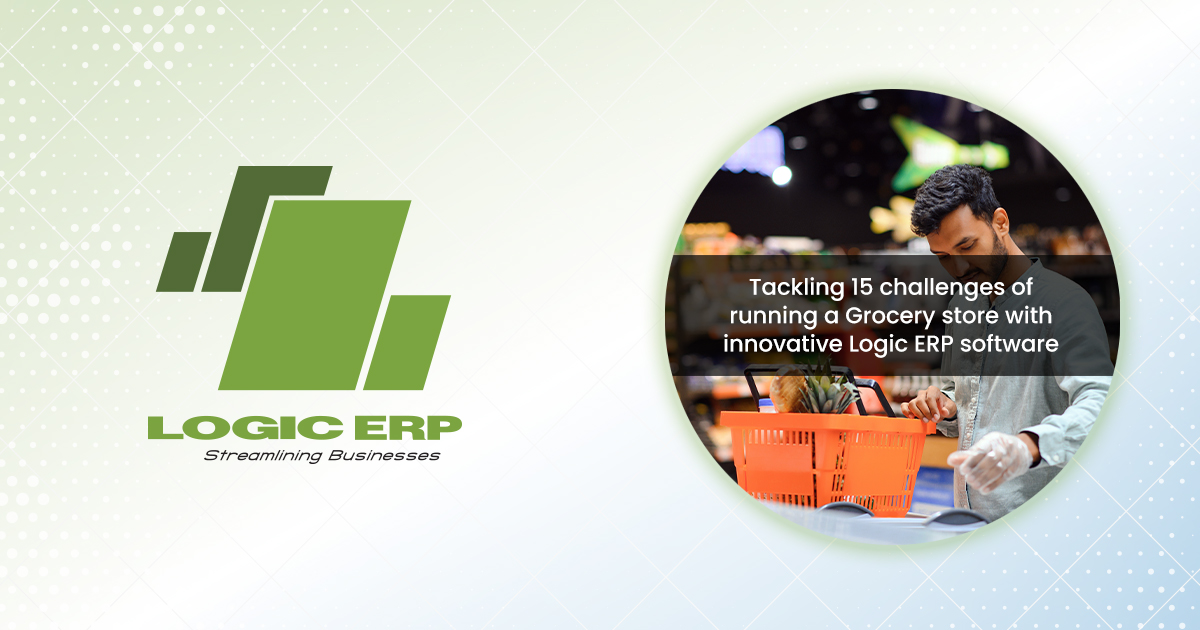

Introduction:
Operating a grocery store is a complex undertaking that involves managing inventory, handling perishable goods, and satisfying customer demands, all while striving for profitability. In the dynamic landscape of retail, grocers face numerous challenges that require innovative solutions. Fortunately, advancements in technology, particularly grocery store software, offer effective remedies to address these hurdles. In this blog, we’ll explore 15 common challenges faced by grocery store owners and managers and discuss how leveraging modern grocery software solutions can help overcome them.
-
Inventory Management: One of the biggest challenges for grocery stores is efficiently managing inventory to minimize waste and stockouts while maximizing profits. Grocery software provides robust inventory management features, including real-time tracking, automated replenishment, and predictive analytics, enabling store owners to optimize stock levels and reduce costs.
-
Vendor Management: Coordinating with multiple vendors to ensure timely delivery of goods and negotiate favorable terms can be overwhelming. ERP software streamlines vendor management processes by centralizing communication, automating purchase orders, and providing insights into vendor performance, fostering better relationships and cost savings.
-
Supply Chain Disruptions: Disruptions in the supply chain, such as natural disasters or transportation issues, can disrupt inventory flow and impact store operations. With grocery software, managers can mitigate supply chain risks by monitoring inventory levels, identifying alternative suppliers, and implementing contingency plans to maintain business continuity.
-
Customer Retention: In an increasingly competitive market, retaining customers is essential for long-term success. ERP Solutions offers customer relationship management (CRM) tools, loyalty programs, and personalized marketing capabilities to enhance customer satisfaction and loyalty, driving repeat business and revenue growth.
-
Shrinkage and Loss Prevention: Theft, spoilage, and administrative errors contribute to shrinkage, eating into profits. Grocery software Solutions helps combat shrinkage by implementing security measures such as surveillance integration, inventory audits, and employee training modules to deter theft and minimize losses.
-
Regulatory Compliance: Compliance with food safety regulations, labeling requirements, and labor laws is critical for grocery stores to avoid fines and maintain public trust. Grocery store software features built-in compliance functionalities, such as automated reporting and audit trails, to ensure adherence to regulatory standards and simplify compliance management.
-
Price Optimization: Setting competitive yet profitable prices for products requires careful analysis of market trends, competitor pricing, and consumer demand. Grocery store software offers pricing optimization tools powered by artificial intelligence and machine learning algorithms to adjust prices dynamically, maximize margins, and capitalize on revenue opportunities.
-
E-commerce Integration: With the rise of online shopping, grocery stores must adapt to meet the demands of digital-savvy consumers. Grocery store software facilitates seamless integration with e-commerce platforms, enabling stores to offer online ordering, home delivery, and click-and-collect services, expanding their reach and staying competitive in the digital marketplace.
-
Staff Scheduling: Efficiently scheduling staff to meet fluctuating demand while controlling labor costs is a balancing act for grocery store managers. Grocery store software provides workforce management features, such as scheduling optimization, time tracking, and labor forecasting, to optimize staffing levels and improve productivity.
-
Customer Experience: Providing a seamless and personalized shopping experience is essential for attracting and retaining customers. Grocery store software offers omnichannel capabilities, self-checkout options, and mobile apps that enhance the shopping experience, empower customers, and drive satisfaction and loyalty.
-
Data Security: Protecting sensitive customer data and maintaining compliance with data protection regulations is paramount in today’s digital age. Grocery store software employs robust security measures, including data encryption, user authentication, and regular security updates, to safeguard against cyber threats and ensure data integrity.
-
Waste Management: Minimizing food waste and managing disposal responsibly are key sustainability initiatives for grocery stores. Grocery retail software tracks expiry dates, implements FIFO (first in, first out) inventory management, and provides insights into waste patterns, helping stores reduce waste, lower costs, and support environmental sustainability efforts.
-
Seasonal Demand: Seasonal fluctuations in demand, such as during holidays or special events, can pose challenges for inventory planning and resource allocation. ERP software utilizes historical data and predictive analytics to anticipate seasonal trends, optimize inventory levels, and capitalize on sales opportunities, ensuring stores are well-prepared to meet customer demand.
-
Technology Adoption: Embracing new technologies and implementing digital solutions can be daunting for traditional grocery stores. Grocery store software offers user-friendly interfaces, training resources, and ongoing support to facilitate technology adoption and empower staff to leverage the full potential of digital tools for improved efficiency and competitiveness.
-
Competition from Online Retailers: The proliferation of online grocery retailers presents a significant threat to traditional brick-and-mortar stores. Grocery store software enables stores to compete effectively by offering omnichannel shopping experiences, leveraging customer data for targeted marketing, and optimizing operational processes to deliver convenience and value that rival online competitors.
Conclusion:
Operating a grocery store comes with its unique set of challenges, from inventory management to competition from online retailers. However, LOGIC ERP offer powerful functionalities to help overcome these obstacles and drive success in today’s dynamic retail landscape. By leveraging technology to streamline operations, enhance customer experiences, and stay ahead of market trends, grocery store owners and managers can position their businesses for long-term growth and sustainability in an increasingly competitive industry.

